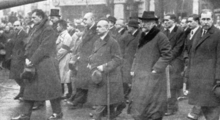Gheorghe Brătianu

Gheorghe Ion Brătianu (born February 12, 1898 in Ruginoasa , Romania , † April 26, 1953 in Sighet ) was a Romanian politician and historian .
Gheorghe was an illegitimate son of the Romanian Prime Minister Ionel Brătianu . He studied philosophy in Iasi , Chernivtsi (1923 doctorate in philosophy) and Paris (1928 doctorate in history). Since 1927 he sat in parliament for the National Liberal Party (Partidul Național Liberal), whose chairman was his father. After the death of his father in 1927, his brother Vintilă Brătianu became prime minister and party leader. When he died in 1930, the party initially chose not another Brătianu, but Ion Duca as its chairman. Gheorghe Brătianu then split off a small, pro-fascist wing of the party, the so-called "Young Liberals", founded his own party and called it Brătianu, deliberately differentiating it from the party led by Duca or with emphasis on the family tradition . His party (also known as the "Georgists") had contacts with the Iron Guard , who murdered Duca, who had also become Prime Minister in 1933. Duca's successor as party leader of the National Liberals was Gheorghe's uncle Constantin "Dinu" Brătianu (Ionel's brother) in 1934 , but the new prime minister was his party rival Gheorghe Tătărescu , who led another wing within the party. After the election defeat of his party in 1937, Gheorghe Brătianu reconciled with his uncle in 1938 and returned to his party as deputy chairman (vice president).
In the conflict with the Iron Guard, Carol II finally established a royal dictatorship in 1938 and left all parties, d. H. forbid both the National Liberal Party and its split (s). Nevertheless, Tătărescu remained Prime Minister until 1940, while Gheorghe Brătianu concentrated on his research and teaching as a historian, where he dealt with Nicolae Iorga , who was also murdered by the Iron Guard in 1940 and whose chair Brătianu then took over. Through numerous publications in which he rejected the migration thesis, among other things , he achieved international reputation and in 1942 became a (corresponding) member of the Romanian Academy . Until 1947 he taught at the University of Iași and the University of Bucharest , then he was arrested (1950) by the Communists, who had come to power, and taken to Sighet Prison, where he was allegedly tortured and died. He is said to have committed suicide. However, in the late 1960s and 1970s, Brătianu's nationalist history was largely rehabilitated by Romania's communists.
Works (selection)
- Le commerce génois sur le Danube (1922)
- Teorii noi în învătămîntul istoriei (1926)
- The problem of the frontieres russo-roumaines pendant la guerre de 1877–1878 et au Congrès de Berlin (1928)
- Research on le commerce génois dans la Mer Noire au III-ème siècle (1929)
- La distribution de l'or et les raisons économiques de la division de l'empire romain (1934)
- Les Vénétiens dans la Mer Noire (1934)
- Napoléon III et les nationalités (1934)
- Privilèges et franchises municipales dans l'empire byzantine (1936)
- Une énigme et un miracle historique: le peuple roumain (1937/1942)
- O enigmă și un miracol istoric: poporul român (1940)
- Origines et formation de l'unité roumaine (1943)
- Tradiția istorică despre întemeierea statelor românești (1945)
Individual evidence
- ↑ a b c d e Christoph Kruspe, Jutta Arndt: Taschenlexikon Romania , pages 46 and 79. Bibliographisches Institut Leipzig 1984
- ↑ a b c d e Georg I. Bratianu , Internationales Biographisches Archiv 30/1948 of July 12, 1948 (lm), in the Munzinger Archive ( beginning of article freely available)
- ↑ a b c d e Lucian Boia : History and Myth - About the presence of the past in Romanian society , pages 91 and 161f. Böhlau, Cologne 2003
- ↑ a b c d e Bernard A. Cook: Europe Since 1945 - An Encyclopedia , Volume 1, page 151. Taylor & Francis, New York 2001
- ↑ a b c d Biographical encyclopedia on the history of Southeast Europe: Brătianu, Gheorghe I.
Web link
| personal data | |
|---|---|
| SURNAME | Brătianu, Gheorghe |
| ALTERNATIVE NAMES | Brătianu, Gheorghe Ion (full name) |
| BRIEF DESCRIPTION | Romanian historian and politician |
| DATE OF BIRTH | February 12, 1898 |
| PLACE OF BIRTH | Ruginoasa , Romania |
| DATE OF DEATH | April 26, 1953 |
| Place of death | Sighet , Romania |
